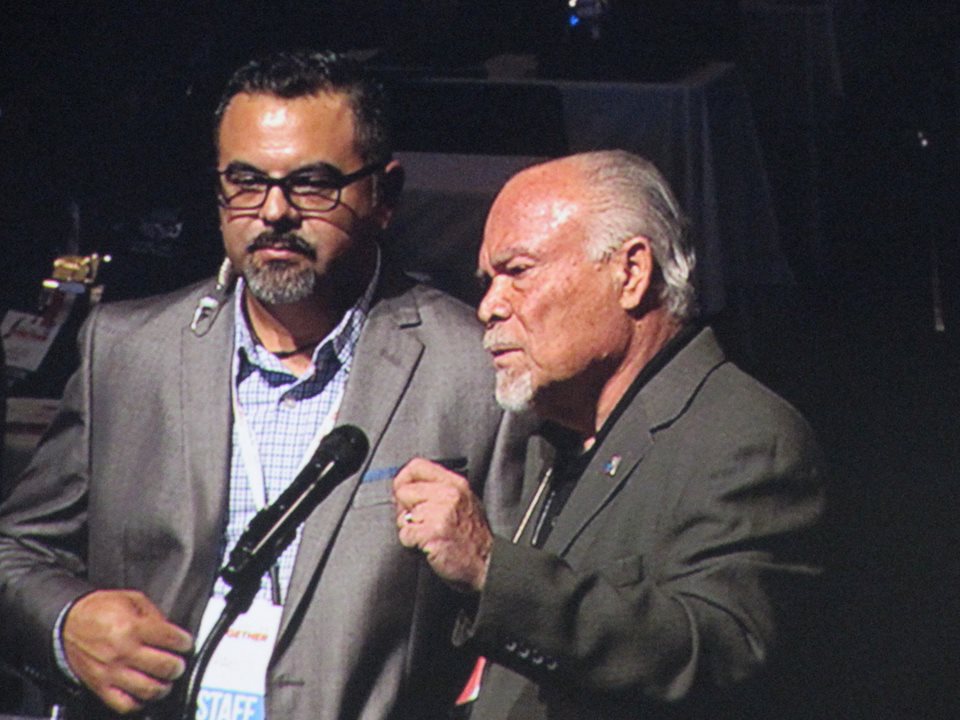

Share
The nation’s largest labor federation convened its national convention – held only every four years – with calls for action and pledges of unity. The gathering comes as unions deal with growing numbers of attacks on the rights of working people.
The goal is “strategizing to change the rules of the U.S. economy and the global economy to work for working people,” AFL-CIO President Richard Trumka said at a media briefing previewing the convention, which began Sunday afternoon and meets through Wednesday in St. Louis.
Whether the rules concern the tax code, health care, immigration or trade, Trumka said, “all of these rules that have been put in place against workers, we’ll be talking about.”
The convention “is about debating the future of our movement,” said AFL-CIO Secretary-Treasurer Liz Shuler, and “how the labor movement changes and adapts with the economy and how we change our own structures.”
The AFL-CIO is a federation of 56 national and international labor unions that represent 12.5 million working men and women, in occupations ranging from construction and manufacturing to government, transportation and the service industry.
Trumka announced that “49 percent of the delegates at this convention are women or people of color… That’s the largest ever… We continue to make progress.”
The convention passed a resolution pledging to continue building “a more diverse and inclusive labor movement.” A pre-convention conference brought together AFL-CIO delegates and activists in the Black Lives Matter movement (see related story).
The AFL-CIO resolution notes how “race has been used to weaken labor unity, limit the growth of the labor movement and damage our efforts to advance economic reforms that benefit all working people … We must integrate the issues and concerns of members and workers of color into labor’s political and policy work at every level.”
Other convention actions on Sunday included resolutions calling for a strong response to the humanitarian crisis in Puerto Rico, whose 3.6 million U.S. citizens are suffering the devastation caused by Hurricanes Maria and Irma.
The AFL-CIO praised the efforts of many unions and union members who have been conducting their own relief efforts and the federation said it will “support and promote Operation Agua, launched by the American Federation of Teachers, the American Federation of State, County and Municipal Employees, Operation Blessing and the Hispanic Federation, and other efforts to provide a reliable source of clean, safe drinking water to families across Puerto Rico.”
Delegates also called for Congress to forgive Puerto Rico’s debt, “to prioritize the lives of Puerto Ricans over debt payments to Wall Street and free up millions of dollars for both short- and long-term recovery efforts.”
A third resolution urged investment in the nation’s infrastructure – roads, bridges, school buildings, transportation and more.
“The labor movement expects Congress to work with the administration to achieve the promises President Trump made in 2016 for a $1 trillion infrastructure plan,” the resolution states. “Yet we know that $1 trillion is not enough to fund existing needs, much less to invest in new infrastructure.
“The labor movement will fight for an infrastructure program that goes beyond this down payment and comprehensively invests in our nation’s future. On this issue, we demand political leadership from both parties. The AFL-CIO and its affiliates support a substantial, long-term infrastructure investment plan, one that lifts up working people, grows the economy, creates high-road jobs and provides increased opportunity for people of color and women.”
View more photos from the convention at the Minneapolis Regional Labor Federation Facebook page.

